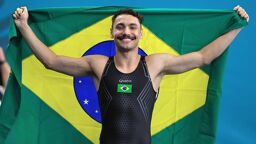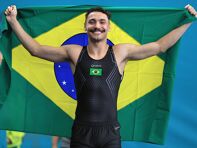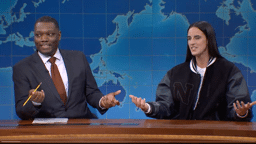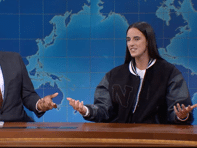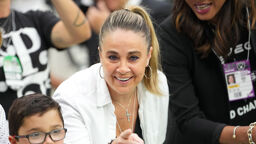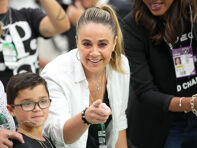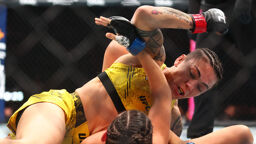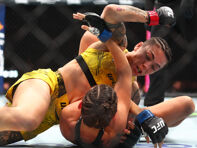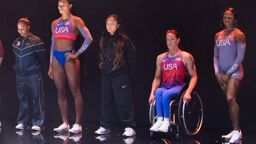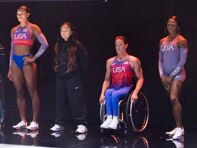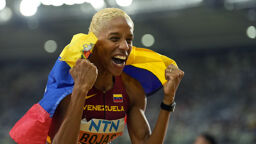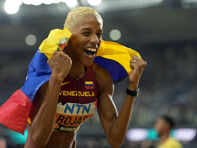(This story was published in 2006).
The funniest moment in the new HBO documentary “Billie Jean King: Portrait of a Pioneer” comes in a scene from 1973, when Chris Evert is asked who she thinks will win the “Battle of the Sexes” between King, 29, and 55-year-old Bobby Riggs.
Riggs, Evert answers with confidence, a few days before King would demolish him in straight sets on prime time national TV. So much for sisters sticking together. The camera cuts to Evert today: “I was such an idiot,” she says with a laugh when shown her prediction.
It seems absurd now that anyone would think the top female tennis player in the world would lose to any 55-year-old man, but it shows how far women’s sports and our thinking have come, thanks in huge part to King.
The compelling documentary (debuts April 26 at 10 p.m. EDT and repeats often) is a superb look at the life and times of King. And what a life it’s been:
The first female athlete to earn $100,000 in a year (which got her a congratulatory phone call from President Nixon). Winner of a record 20 Wimbledon titles. An ardent feminist who had an abortion in 1973 (and whose husband told Ms. Magazine about it, much to her chagrin). Best buds with Elton John (who wrote “Philadelphia Freedom” in her honor). Founder of the Women’s Tennis Assn., which pushed for bigger paydays for women players. Married for years before being outed in 1981 in a palimony suit. Named by Life magazine as one of the 100 most important Americans of the 20th century. Whew.
King’s philosophy was simple and powerful: “Equal opportunity for boys and girls.” Yet such an obvious statement was considered by many to be revolutionary and King was fought every step of the way. That she persevered is a gift to women athletes and to anyone who believes in equal treatment.
The film sucks you in from the start, from King’s formative years growing up in Long Beach, Calif., through her career to the present day, where she remains active with World Team Tennis and lives with longtime partner Illana Kloss, herself a former player. King seems at peace with herself, especially since her parents have come to terms with her sexuality. As Kloss says, King’s idea of the perfect meal these days is a hot dog and soda with her parents at Costco.
The film’s strength lies in the honesty of those interviewed. For the longest time, Billie Jean King resisted having her ex-husband Larry King (not the CNN talk show host) appear, yet making a film that was anywhere near complete would not have been possible without his cooperation. Theirs was far from a perfect marriage, yet as Larry King says, “She’s inspiring … I never regretted a day I spent with Billie Jean. I don’t think anybody does.”
“Portrait of a Pioneer” is a great history lesson seen through the eyes of a trailblazer. The footage dug up by producer Margaret Grossi and her associates is amazing and offers a whirlwind tour through the late ’60s and early ’70s when King was at her peak, and the Vietnam War and equal rights marches brought millions onto the street. It’s a film that should be required viewing in high school history classes, showing how the personal can become the political and one man or woman can make a difference.
The most entertaining segment is the famed contest with Riggs, no doubt the most anticipated and viewed tennis match of all time (any event held at the Houston Astrodome that featured Howard Cosell in the booth, George Foreman as King’s bodyguard and a dressed-up pig had to be big). The stakes were high for King and women’s tennis; just months before the September “Battle of the Sexes,” Riggs had stunned Margaret Court in straight sets. As Deford said of King: “If she lost [to Riggs], it truly would have hurt women’s tennis … and it would have hurt Billie Jean King … I don’t think she would have remained as substantive a character thereafter.”
One previously unknown bit of news from the match we learn was how King forced ABC sports bigwig Roone Arledge to drop Jack Kramer from the telecast. Long a male chauvinist, Kramer had derided women’s tennis for years. “He doesn’t believe in women’s tennis,” King said. “Why should he be part of this match? He doesn’t believe in half of the match. I’m not playing. Either he goes – or I go.” King, as she often did, got her way. (King told the Los Angeles Times recently, “What didn’t make the show, is that Jack and I made our peace in 1984, before the Olympics in Los Angeles, at the home of UCLA chancellor Charles Young.”)
If the win over Riggs left King on top of the world, her nadir had to have been the 1981 palimony suit filed by Marilyn Barnett; the two had an affair in the 1970s. King won the lawsuit, but the resulting publicity caused sponsors to drop her and ultimately ended her marriage. She called the affair “a mistake,” a phrase that angered many gays and lesbians who felt she was making a comment on homosexuality. In the film, King regrets the choice of words and said “mistake” referred to the fact that she believed in monogamy and yet was cheating on her husband. Given King’s openness about her orientation and her activism, it’s an explanation that should satisfy any critic.
No narrator is used, a technique that works extremely well in this case. King, of course, is on camera a lot, and there are terrific interviews with her biographer Frank Deford, Evert, Martina Navratilova, Elton John, Kloss and King’s parents. At a screening in Hollywood, Mary Carillo, one of the off-camera interviewers, joked that the producers demanded such emotional honesty from King that they extracted her heart, lungs, liver and pancreas.
While admitting that baring her soul and secrets was often painful, King said after the screening why it was important.
“If we could help one person be more comfortable in their skin, it’s been worth it.”

























